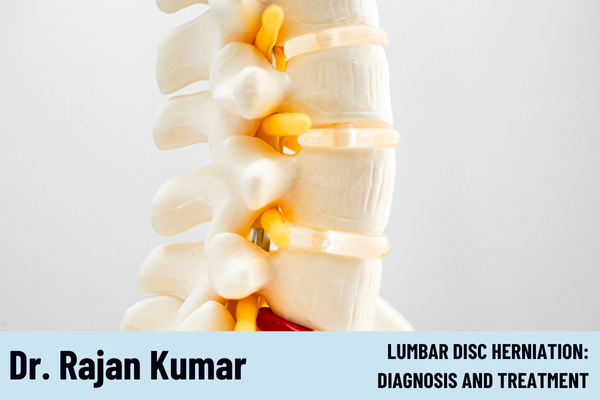Back pain is one of the most common health complaints worldwide, and lumbar disc herniation is a leading cause. This condition can significantly impact your daily life by causing discomfort and limiting mobility. Dr. Rajan Kumar, one of the best neurosurgeons in Kolkata, sheds light on lumbar disc herniation, its diagnosis, and the best treatment approaches available to manage this condition effectively.
What is Lumbar Disc Herniation?
The spine is made up of bones (vertebrae) cushioned by discs. These discs act as shock absorbers, allowing for flexibility and movement. However, when one of these discs in the lower back (lumbar region) becomes damaged or ruptured, its soft inner material can push out, compressing nearby nerves. This condition is known as lumbar disc herniation, or a “slipped disc.”
Symptoms of Lumbar Disc Herniation
Lumbar disc herniation can cause various symptoms, depending on the severity and the nerves affected. The most common signs include:
- Lower back pain: Persistent or sharp pain in the lower back.
- Leg pain (sciatica): Pain radiating from the lower back down the leg, often on one side.
- Numbness or tingling: Loss of sensation or a tingling feeling in the leg or foot.
- Muscle weakness: Weakness in the legs or difficulty lifting the foot (foot drop).
- Difficulty in movement: Trouble bending, sitting, or standing for long periods due to discomfort.
Causes of Lumbar Disc Herniation
Several factors can contribute to lumbar disc herniation:
- Aging: As we age, the discs in the spine lose water content, making them less flexible and more prone to tearing.
- Injury: Sudden injuries or trauma to the back can cause the disc to rupture.
- Repetitive stress: Jobs or activities that involve repetitive bending or lifting can lead to disc herniation over time.
- Genetics: Some individuals may have a predisposition to disc degeneration due to hereditary factors.
Diagnosis of Lumbar Disc Herniation
Accurate diagnosis is key to successful treatment. Dr. Rajan Kumar explains that the diagnostic process usually involves:
- Physical Examination: A thorough examination to assess reflexes, muscle strength, and the range of motion.
- Imaging Tests: MRI or CT scans are often used to confirm disc herniation and determine the severity of nerve compression.
- Nerve Tests: Electromyography (EMG) or nerve conduction studies may be used to evaluate nerve damage.
Treatment Options
Treatment for lumbar disc herniation ranges from conservative approaches to surgical interventions. Dr. Rajan Kumar outlines the following options:
1. Conservative Treatments
For most patients, non-surgical treatments can provide relief:
- Physical therapy: Strengthening and stretching exercises to relieve pressure on the nerve.
- Medications: Anti-inflammatory drugs, muscle relaxants, and pain relief medications can help reduce symptoms.
- Rest: Avoiding activities that aggravate the condition and giving the back time to heal.
- Epidural injections: Cortisone injections may reduce inflammation and provide temporary pain relief.
2. Surgical Treatments
When conservative methods fail or if the patient experiences severe symptoms, surgery may be recommended:
- Microdiscectomy: A minimally invasive procedure where the herniated portion of the disc is removed to relieve pressure on the nerve.
- Lumbar fusion: In severe cases, spinal fusion surgery may be performed to stabilize the spine.
Conclusion
Lumbar disc herniation is a common yet manageable condition. With proper diagnosis and the right treatment plan, patients can experience significant relief and return to their regular activities. Dr. Rajan Kumar, a leading neurosurgeon in Kolkata, offers expert care and advanced surgical techniques to treat lumbar disc herniation effectively. If you’re suffering from persistent back pain, consult with Dr. Kumar for a comprehensive evaluation and tailored treatment plan.
For more information or to schedule a consultation, contact Dr. Rajan Kumar, one of the best neurosurgeons in Kolkata.

